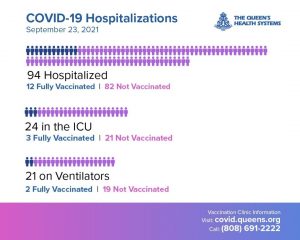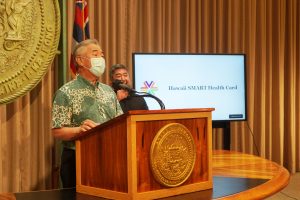From the governor: Vaccinations, testing to save lives
Posted on Sep 27, 2021 in Capitol Connection, Featured, MainWhat will it take for more people to get vaccinated against COVID-19? The answer seems to be at the grassroots — from local folks talking to friends and family about the risks of infection to community leaders calling for people to get vaccinated NOW. Sure, masks and physical distancing can help. Testing helps. But vaccination offers the best protection for those eligible and to protect everyone around us — especially our keiki. It’s our kuleana to bring case counts down, Hawai‘i. As more people are realizing, it’s a public health issue, not a political one.
Q: What is the latest outlook for our COVID-19 case counts?
A: We’re looking for a significant downward trend, as well as lower daily case counts. That’s why we need everyone’s help in this fight, and people are responding. The state Department of Health is working with community groups to expand testing and vaccination in hardest-hit areas. Native Hawaiian and church leaders have stepped up to help. A large percentage of state and county workers as well as business employees have been vaccinated. Restaurant owners and customers are following the new requirements, and more than 216,000 people have registered for our new SMART Health Card. Over Labor Day, we had more enforcement and fewer large gatherings, so people seem to be getting the message that we have to protect each other.
Q: Where do we stand on hospitalizations and available patient beds?

As Queen’s Medical Center Facebook posts show, unvaccinated people in the hospital far outnumber those vaccinated.
A: The hospitalizations have fallen a little, but we’re not out of the woods yet. The trigger really is the number of intensive care unit patients we can handle. Our healthcare staff is exhausted. That’s why we’ve deployed more than 600 healthcare workers from out-of-state to hospitals across the islands. That’s also why we’re working so hard to keep people out of the hospitals with our mandates, vaccination campaigns and testing, as well as better therapeutics. So far, none of our hospitals have had to invoke a “crisis standard of care” plan. We want to avoid that worst-case scenario of having to make tough decisions about patient treatment.
Q: Why are we not implementing stricter measures, like shutdowns or requiring post-testing of travelers?
A: There won’t be a full-scale shutdown because the mayors and I realize there’s a lot of COVID fatigue. We’re trying to not penalize those who are already vaccinated or hurt local businesses and their employees, who are just starting to get back on their feet. The majority of our population — more than 66% — have been fully vaccinated and have been doing what we’ve asked of them. As for traveler post-testing, the challenge would be keeping up with demand. In recent weeks, we’ve averaged 9,000 to 10,000 tests a day because of employment requirements and people concerned they’ve been infected. We don’t want to take away testing capacity from those who need it locally.
Q: Why was Hawai‘i’s participation in the September 2021 World Conservation Congress so important?
A: The pandemic has shown us how connected we are as a global community. The warning signs of climate change are all around us with more wildfires and sea level rise. We were the first state to host this international event in 2016 and became an example for the world in fighting climate change through our Sustainable Hawai‘i Initiative. We were able to show how our island communities are working together to preserve our environmental and cultural connections. It’s important that communities large and small be willing to advocate for what they believe in because that can encourage others to do the same.
